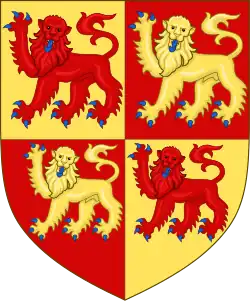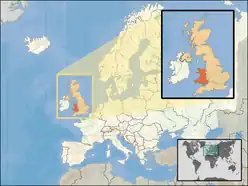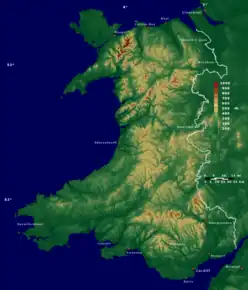Historic coat of arms of Llywelyn the Great
Location of Wales (orange)
– in the European continent (camel & white)– in the United Kingdom (camel)
Enlargeable relief map of Wales
The following outline is provided as an overview of and topical guide to Wales:
Wales – a country that is part of the United Kingdom,[1] bordered by England to its east and the Atlantic Ocean and Irish Sea to its west. It has an estimated population of three million and the Welsh and English languages are both official languages. The Welsh language is an important element of Welsh culture. Its decline has reversed over recent years, with Welsh speakers estimated to be around 20 per cent of the population of Wales.[2]
General reference
- Pronunciation: /ˈweɪlz/ ⓘ
- Etymology of "Wales"
- Common English country name(s): Wales
- Official English country name(s): Wales
- Common endonym(s): Cymru
- Official endonym(s): Cymru
- Adjectival(s): Welsh
- Demonym(s): Welsh
Geography
- Wales is a country that is part of the United Kingdom.
- Location
- Atlantic Ocean
- Northern Hemisphere
- Eurasia (but not on the mainland)
- Europe
- Northern Europe and Western Europe
- British Isles
- Great Britain (the central southern part of the island's western side)
- Several other islands of Wales, the largest being Anglesey
- British Isles
- Northern Europe and Western Europe
- Europe
- Extreme points of Wales
- Population of Wales: 2,999,300 (2009 estimate)
- Area of Wales: 20,779 km2 (8,023 sq mi)
- Atlas of Wales
Environment
Environment of Wales
- Climate of Wales
- Ecology of Wales
- Environmental issues in Wales
- Geology of Wales
- Protected areas of Wales
- Biosphere reserves in Wales
- National parks of Wales
- AONBs in Wales
- Wildlife of Wales
- Flora of Wales
- Fauna of Wales
- Birds of Wales
- Mammals of Wales
Natural geographic features
Regions
Regions of Wales; common models:
- Two region model:
- Four region model:
- Economic regions of Wales
- List of ecoregions in Wales
Administrative divisions
Administrative divisions of Wales
Local government
- Blaenau Gwent
- Bridgend County Borough
- Caerphilly County Borough
- Cardiff
- Carmarthenshire
- Ceredigion
- Conwy County Borough
- Denbighshire
- Flintshire
- Gwynedd
- Isle of Anglesey
- Merthyr Tydfil County Borough
- Monmouthshire
- Neath Port Talbot
- Newport
- Pembrokeshire
- Powys
- Rhondda Cynon Taf
- Swansea
- Torfaen
- Vale of Glamorgan
- Wrexham County Borough
Preserved counties
Historic counties
Former Districts
Cities
Demography
Government and politics
- Form of government:
- Capital of Wales: Cardiff
- Elections in Wales
- Political parties in Wales
- Welsh nationalism
- Welsh devolution
- Welsh unionism
- Welsh separatism
- Welsh republicanism
Branches of the government
Executive
- Head of government: First Minister of Wales
- Welsh Government
- Wales Office (Department of UK Government) – it is primarily responsible for carrying out the few functions remaining with the Secretary of State for Wales that have not been transferred already to the Senedd; and for securing funds for Wales as part of the annual budgetary settlement.
Legislative
- Senedd (the Welsh Parliament; Senedd Cymru) (devolved unicameral)
Judicial
Law and order in Wales
- English law – the law currently in force in England and Wales.
- Contemporary Welsh Law
- Human rights in Wales
- Law enforcement in Wales
- Medieval Welsh law (historical)
Military
Military of Wales within the Military of the United Kingdom
- Command
- Commander-in-chief:
- Charles III
- Commander-in-chief:
- Forces
- Military history of the United Kingdom
- Military history of Wales
- Military ranks of the United Kingdom
Local government in Wales
History
- Timeline of Welsh history
- Bibliography of Welsh history
- Current events of Wales
History of Wales, by period
- List of years in Wales
- Prehistoric Wales
- Wales in the Roman era
- Wales in the Early Middle Ages
- Norman invasion of Wales
- Wales in the High Middle Ages
- Wales in the Late Middle Ages
- Early modern period in Wales
- Industrial Revolution in Wales
- Welsh settlement in the Americas
- Wales in the World Wars
- Modern history of Wales
History of Wales, by region
History of Wales, by subject
Culture
- Cultural relationship between the Welsh and the English
- Architecture of Wales
- Cuisine of Wales
- Ethnic minorities in Wales
- Festivals in Wales
- Languages of Wales
- Media in Wales
- National symbols of Wales
- People of Wales
- Prostitution in Wales
- Public holidays in Wales
- World Heritage Sites in Wales
Art in Wales
Religion in Wales
Sport in Wales
Economy and infrastructure
- Economic rank (by nominal GDP):
- Agriculture in Wales
- Banking in Wales
- Communications in Wales
- Internet in Wales
- Companies of Wales
- Currency of Wales: Pound Sterling
- Economic history of Wales
- Energy in Wales
- Energy policy of Wales
- Oil industry in Wales
- Food and drink industry of Wales
- Forestry in Wales
- Healthcare in Wales
- Social care in Wales
- Manufacturing in Wales
- Mining in Wales
- Science and technology in Wales
- Stock exchanges in the United Kingdom
- Tourism in Wales
- Transport in Wales
- Airports in Wales
- Rail transport in Wales
- Roads in Wales
- Water supply and sanitation in Wales
- Welsh Automotive Forum
Education in Wales
See also
References
- ↑ "The Countries of the UK". statistics.gov.uk. Retrieved 10 October 2008.
- ↑ "Welsh Language Board - Number of speakers". Byig-wlb.org.uk. Archived from the original on 24 May 2010. Retrieved 19 June 2010.
External links
This article is issued from Wikipedia. The text is licensed under Creative Commons - Attribution - Sharealike. Additional terms may apply for the media files.




